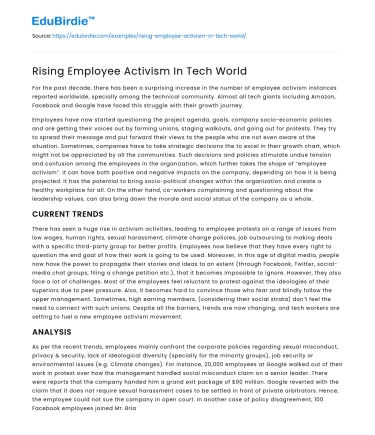For the past decade, there has been a surprising increase in the number of employee activism instances reported worldwide, specially among the technical community. Almost all tech giants including Amazon, Facebook and Google have faced this struggle with their growth journey.
Employees have now started questioning the project agenda, goals, company socio-economic policies and are getting their voices out by forming unions, staging walkouts, and going out for protests. They try to spread their message and put forward their views to the people who are not even aware of the situation. Sometimes, companies have to take strategic decisions the to excel in their growth chart, which might not be appreciated by all the communities. Such decisions and policies stimulate undue tension and confusion among the employees in the organization, which further takes the shape of “employee activism”. It can have both positive and negative impacts on the company, depending on how it is being projected. It has the potential to bring socio-political changes within the organization and create a healthy workplace for all. On the other hand, co-workers complaining and questioning about the leadership values, can also bring down the morale and social status of the company as a whole.
Save your time!
We can take care of your essay
- Proper editing and formatting
- Free revision, title page, and bibliography
- Flexible prices and money-back guarantee
CURRENT TRENDS
There has seen a huge rise in activism activities, leading to employee protests on a range of issues from low wages, human rights, sexual harassment, climate change policies, job outsourcing to making deals with a specific third-party group for better profits. Employees now believe that they have every right to question the end goal of how their work is going to be used. Moreover, in this age of digital media, people now have the power to propagate their stories and ideas to an extent (through Facebook, Twitter, social-media chat groups, filing a change petition etc.), that it becomes impossible to ignore. However, they also face a lot of challenges. Most of the employees feel reluctant to protest against the ideologies of their superiors due to peer pressure. Also, it becomes hard to convince those who fear and blindly follow the upper management. Sometimes, high earning members, (considering their social strata) don’t feel the need to connect with such unions. Despite all the barriers, trends are now changing, and tech workers are setting to fuel a new employee activism movement.
ANALYSIS
As per the recent trends, employees mainly confront the corporate policies regarding sexual misconduct, privacy & security, lack of ideological diversity (specially for the minority groups), job security or environmental issues (e.g. Climate changes). For instance, 20,000 employees at Google walked out of their work in protest over how the management handled social misconduct claim on a senior leader. There were reports that the company handed him a grand exit package of $90 million. Google reverted with the claim that it does not require sexual harassment cases to be settled in front of private arbitrators. Hence, the employee could not sue the company in open court. In another case of policy disagreement, 100 Facebook employees joined Mr. Brian Amerige to form an online group called ‘FB’ers for Political Diversity. The group was created over an online comment where the company posted about being intolerant to different political views.
Second type of agitation arises when companies make high-profit contracts with third parties or indulge in job outsourcing, to which the employees don’t approve. Grameenphone, the biggest wireless telecommunication network in Bangladesh, announced that it was initiating a project to hand over its operations to a third party, hence would outsource work through other tech firms. Around 600 operation workers could thus lose their job with this move. Hence, their employee union, (GPEU) demanded and protested for complete rollback of this decision.
RECOMMENDATIONS
All the tech-giants mostly encourage transparency, freedom of expression and accountability as their key company values and try their best to live up to the one-team brand culture. Employees also prefer to work at a place with ideological diversity, where seniors give due attention to their feedbacks and suggestions, irrespective of the role, cultural roots, gender or political bias.
REFERENCES
- The Daily Star. (2019, July. 11). Job cut fear grips GP employees [Online]. Available: https://www.thedailystar.net/business/news/job-cut-fear-grips-gp-employees-1655953
- The Financial Times. (2019, Jan 21) Shannon Bond #MeToo in Silicon Valley [Online]. Available: https://www.ft.com/content/af5f42a8-1501-11e9-a168-d45595ad076d?fbclid=IwAR0F1QE7C1e_MI55t309N-xCki96duZH8tyH6R9CBclnir3wVp1UeEKC1LQ
- The New York Times. (2018, Oct, 25 Daisuke Wakabaysahi and Katie Benner - How Google Protected Andy Rubin, the ‘Father of Android’ [Online] Available: https://www.nytimes.com/2018/10/25/technology/google-sexual-harassment-andy-rubin.html
- The Brink News. (2018, Dec 13). Richard Levick - Employee Activism Is On the Rise. How Can Companies Respond? [Online]. Available: https://www.brinknews.com/employee-activism-is-on-the-rise-how-can-companies-respond/
- The New York Times. (2018, Aug 28). Dozens at Facebook Unite to Challenge Its ‘Intolerant’ Liberal Culture [Online]. Available: https://www.nytimes.com/2018/08/28/technology/inside-facebook-employees-political-bias.html






 Stuck on your essay?
Stuck on your essay?

